Criteria for selecting a heat circulation pump for a pool
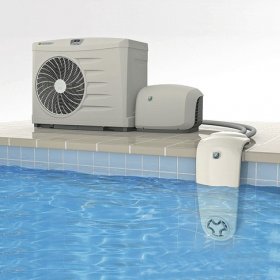
Pool owners are well aware of the almost astronomical sums of heating a large amount of water to an acceptable temperature. The cost of energy is growing steadily, which forces us to look for suitable alternatives to conventional heating devices. Fortunately, they are available - instead of a gas boiler or electric heater, a special pool pump is used - a thermal one. Today we’ll talk about how this pump works and what selection criteria exist.
The principle of operation of this unit
Unlike a conventional pool circulation pump, the so-called heat pumps for indoor or outdoor pools do not pump water, but low-potential environmental energy. Soil, water and air contain some heat. With the help of a special facility, this energy can be accumulated and used for domestic needs.
In more detail, the principle of operation of the heat pump is described in the following video:
Different types of pool heat pumps work on the same principle as a conventional refrigerator, taking heat from the source and transferring it for heating. Energy can be used as a heat source:
- land;
- groundwater;
- natural or artificial ponds;
- air, etc.
They are successfully used for heating pools of the air-water installation, which receive heat from the surrounding air. Entering the system, energy with a low potential passes through a condenser, evaporator and compressor, after which it turns into high-potential thermal energy, which is quite suitable for heating a large amount of water.
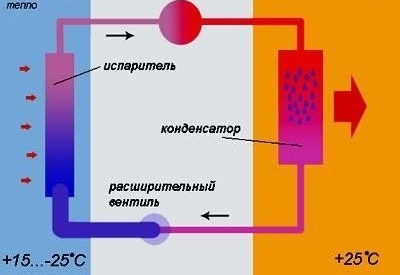
The principle of operation of the heat pump is based on the fact that it accumulates low-potential environmental energy and converts it into thermal energy with a high potential suitable for use in everyday life
Note! The compressor will need power supply, but this electricity is not used to heat water, but only for the operation of the equipment. Spending only 1, -2.5 kW of electricity per hour, geothermal pumps for pools can produce about 10 kW of heat.
The first and most obvious advantage of a heat pump is quite obvious - it is a significant savings in the cost of heating water. In addition, constructions of this type are also successfully used for other needs, for example, for heating an indoor pool, and in summer for air conditioning. Heat pumps are considered safer when used in high humidity conditions than other equipment.
How to choose a suitable model?
The main disadvantage of heat pumps is that the price of such equipment remains quite high. However, the costs pay off very quickly, especially if the model for a particular pool is selected correctly.
When choosing a heat pump, it is necessary to take into account a number of factors such as:
- pool location: indoors or outdoors;
- type of pool shelter;
- location and type of heat pump;
- the amount of water that needs to be heated;
- initial water temperature;
- temperature to which water should be heated;
additional functions: space heating, air conditioning, etc.
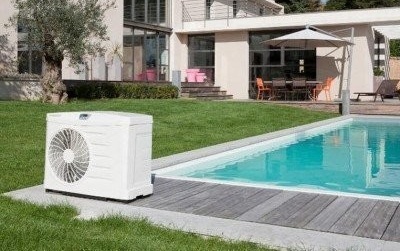
Branded pool heat pumps are equipment that necessarily contains an automatic control unit. As a result, servicing the heat pump becomes extremely easy.
Note! Modern heat pumps are fully automated systems, the maintenance of which will require minimal effort. Such equipment is installed after the filtration system, but before the disinfection systems. The most practical choice can be considered devices equipped with special connectors for connecting to the system and for connecting the power supply, since this greatly simplifies the installation of the pump.
A few words about the calculations
One of the basic indicators that must be followed when choosing a heat pump for your pool is the capacity of the heat exchanger, which is responsible for the process of heating water to the optimum temperature. To calculate this indicator, it is necessary to determine the level of energy that will be spent on increasing the water temperature to a given level per unit time:
P = 1.16 X ΔT / t X V (kW), where
- 1.16 is a coefficient that corrects for heat loss in contact with pool structures;
- ΔT is the difference between the initial temperature of the water and the temperature to which the water in the pool must be heated, ºС;
- t is the time during which the heat pump allows for the heating of water to a given temperature, hour;
- V is the volume of the pool, cubic m
This calculation allows you to determine the type of equipment at the initial stage, but it should be noted that factors such as ventilation of the pool room, air conditioning, regulation of air humidity, etc. are not taken into account. In order to carry out such detailed calculations, more complex methods should be applied. about which it is better to consult with specialists.
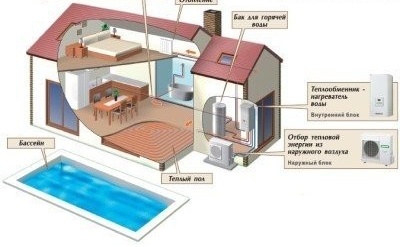
The energy obtained with the help of a heat pump can be effectively used not only for the pool, but also for other purposes: heating rooms, heating hot water in the water supply system, for a warm floor, etc.
Note! For indoor pools, consider the optimum water temperature in the range 22-24 ºС, and the air is usually heated to 26-28 ºС. These parameters are usually used when choosing a suitable heat pump.
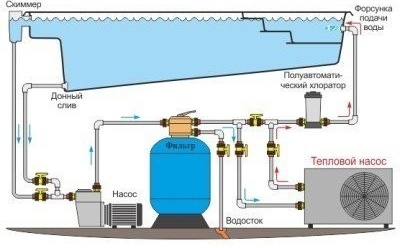
This is how the classic diagram of connecting a heat pump to the equipment circuit looks. It connects almost at the very end of the circuit, in front of the water chlorinator
The maximum effect of the operation of the heat pump depends not only on the correct choice of equipment, but also on other factors. For example, experts recommend using vibration-proof pipelines that are coated with a protective sheath when installing internal heat exchangers. An important point is the diagnosis of the condition of the equipment at each stage of installation. Particular attention should be paid to the additional protection of all electrical connections, as well as the use of auxiliary materials, component parts and installation equipment, which is recommended by the manufacturer of the selected heat pump.
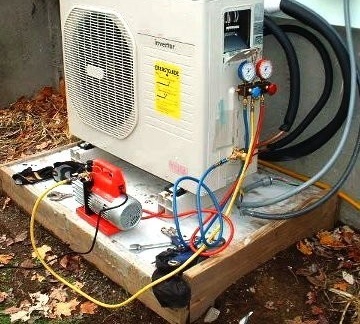
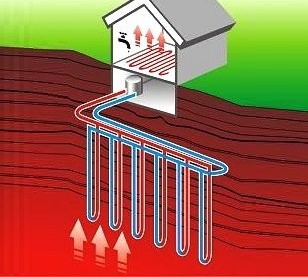
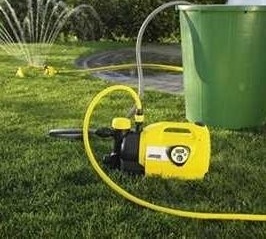
1 comment